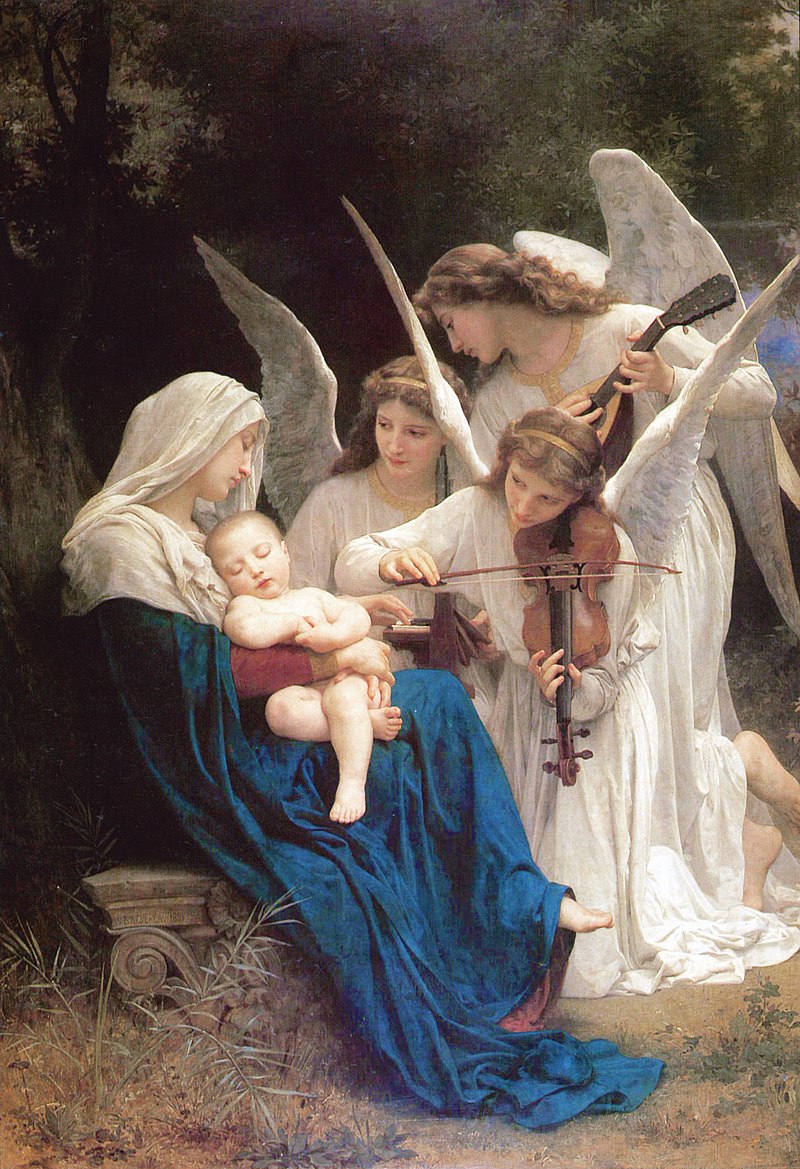Text from The Saint Andrew Daily Missal,
unless otherwise stated.
Fourth Sunday of Advent.
Station at The Church of The Twelve Apostles.
Indulgence of 15 years and 15 Quarantines.
Privileged Sunday of The Second-Class.
Semi-Double.
Violet Vestments.
Saint John the Baptist Preaching The Baptism of Penance.
Artist: Rene de Cramer.
“Copyright Brunelmar/Ghent/Belgium”.
Used with Permission.
And Saint Leo says, "God Himself teaches us by the Prophet Isaias: I will lead the blind in a way that they know not, and I will turn the darkness before them into light and I will not forsake them."
[Editorial Comment: Do Not Be Disheartened. Do Not Despair. The World May Look Bleak And The Church Attacked From All Sides (And Within), But We Have Been Promised Deliverance. See what Isaias says, above.]
Like the whole Liturgy off this Season, the purpose of The Mass for The Fourth Sunday of Advent is to prepare us for the twofold coming of Christ: His coming in Mercy at Christmas; and in Justice at The End of The Word. Allusion is made to the first in the Introit, Gospel, Offertory and Communion, and to the second in the Epistle; while the Collect, Gradual, and Alleluia can be applied to either of the two.
In this Mass, we meet once again with the three great figures that are before the mind of The Church throughout Advent: Isaias; Saint John the Baptist; Our Lady.
Artist: Rene de Cramer.
“Copyright Brunelmar/Ghent/Belgium”.
Used with Permission.
The Prophet Isaias foretells of Saint John the Baptist that he will be: "A voice of one crying in the wilderness: Prepare ye the way of The Lord, make straight His paths . . . and all flesh shall see The Salvation of God." And "The Word of The Lord was made unto John, the son of Zachary, in the desert. And he came into all the country about The Jordan, Preaching the Baptism of Penance for the remission of sins" (Gospel).
"John", Saint Gregory explains, "told those who hurried in crowds to be Baptised: "Ye brood of vipers, who hath told you to flee from the wrath to come ?" Now, the wrath to come is the final chastisement, which the sinner will not be able to escape unless he have recourse now to the lamentations of Penance.
The "Friend of the Bridegroom" [Editor: Saint John the Baptist] warns us to bring forth not fruits merely of Penance, but worthy fruits. These words are a call to each man's conscience, bidding him lay up, by means of Penance, a treasure of good works, the greater in proportion to the ravage of sin which caused it [Third Nocturn].
And Saint Leo says, "God Himself teaches us by the Prophet Isaias: I will lead the blind in a way that they know not, and I will turn the darkness before them into light and I will not forsake them."
The Apostle Saint John makes clear to us, the way in which this Mystery is fulfilled, when he says, "And we know that The Son of God is come. And He hath given us understanding that we may know The True God and may be in His True Son" [Second Nocturn].
The Liturgy continues: Because of the great love that God has manifested towards us, He has sent on Earth His Only-Begotten Son to be born of The Virgin Mary. Also, in The Communion sentence, The Church recalls to us the Prophecy of Isaias: "Behold, a Virgin shall conceive and bear a Son; and His Name shall be called Emmanuel."
And, again, in the Offertory, she combines in a single salutation the words addressed to Our Lady by the Archangel and by Saint Elizabeth. Saint Gregory writes: "Gabriel, whose name means 'Strength of God', is sent to Mary, since he comes to announce The Messias, Whose Will it is to appear in humiliation and abasement, in order to subdue all the powers of the air. It was fitting that He should be heralded by Gabriel, the 'Strength of God'; He, Who was to come as The Lord of Might, The All-Powerful and Unconquerable in Battle, to crush the powers of the air in universal defeat" (Sermon 35).

In The Collect, just as we are reminded of the display of Our Lord's "Great Might", which will take place at the time of His second coming, when, as Supreme Judge, He will come in the splendour of His Divine Majesty to render to each according to His works, so we find an allusion to this same great power manifested in His first coming. It was as one clothed in His weak and mortal human nature that Our Lord put the devil to flight.
As we think of Our Lord as nigh at hand in one or other of His "comings", let us say, with The Church, "Come, Lord Jesus, and tarry not."
Every Parish Priest Celebrates Mass for the people of his Parish.
Mass: Roráte caeli.









.jpg&container=blogger&gadget=a&rewriteMime=image%2F*)
.jpg)

.bmp)





